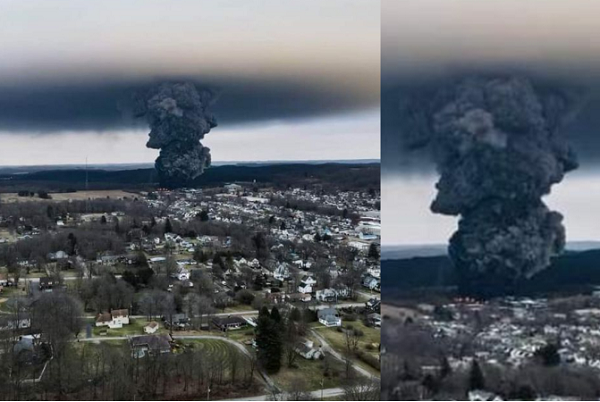'We're dying slowly' - East Palestine residents complain of worsening health problems despite being given the 'all clear' by Biden regime
The residents of the small town of East Palestine, Ohio, which is unquestionably Trump Country, are increasingly complaining of worsening health issues following a massive chemical spill and burn-off after a train derailed there on Feb. 3.
As a result of the Norfolk South train derailment and toxic explosion, Wade Lovett has been experiencing difficulty breathing. In fact, his voice now resembles that of someone who has inhaled helium, the
New York Post reports.
“Doctors say I definitely have the chemicals in me but there’s no one in town who can run the toxicological tests to find out which ones they are,” Lovett, 40, an auto detailer, told The Post in a very high-pitched voice. “My voice sounds like Mickey Mouse. My normal voice is low. It’s hard to breathe, especially at night. My chest hurts so much at night I feel like I’m drowning. I cough up phlegm a lot. I lost my job because the doctor won’t release me to go to work.”
Despite struggling with health issues, Wade Lovett and his fiancée, Tawnya Irwin, aged 45, spent last Thursday distributing bottled water to residents affected by the train derailment, The Post reported. They collected fresh supplies of water from a residence on East Clark Street, which has become the center of East Palestine's grassroots campaign to combat the upheaval caused by the disaster, affecting approximately 4,700 individuals and their pets, the outlet said.
At the forefront of the fight for their community is 46-year-old Jami Cozza, a lifelong resident of East Palestine who has 47 close relatives living in the area. Many of them are grappling with health problems resulting from the chemical fire, as well as the emotional burden of their town being dubbed the new "Love Canal" by a scientist who visited the area on Thursday. The Love Canal was a neighborhood in Niagara Falls, New York, that gained notoriety in 1978 because individuals were falling sick due to residing above a contaminated waste site, the outlet's report continued, adding:
Her eyes fill with tears when she talks about how her 91-year-old widowed grandmother tried to clean the chemicals off the furniture in the house she’s lived in for 56 years — before giving up and moving to a hotel room where she can’t sleep at night.
Evacuation orders were lifted on February 8, but many locals say they got unexplained rashes and sore throats when they returned home. The creeks that dot the town still ripple with the telltale rainbow color of contamination if you throw a rock in them.
Meanwhile,
The Wall Street Journal reports that there are increasing concerns about
food production in the area being tainted for years to come.
In recent days, social media has become a platform for people to voice their concerns regarding the broader chemical impacts of the disaster. Several individuals took to Facebook to inquire about the safety of drinking Giant Eagle water bottled in the southern region of East Palestine.
Some claimed to have contacted the company directly to voice their concerns. In response, the grocery chain announced on Tuesday that it would remove water items bottled in Salineville, Ohio, located roughly 25 miles from East Palestine, from their store shelves, the outlet noted.
According to
an independent assessment of Environmental Protection Agency data carried out by Texas A&M University, nine air pollutants have been identified at levels that may lead to long-term health concerns in and around East Palestine. The findings, released on Friday, appear to contradict previous assertions made by state and federal regulators regarding the air's safety in the area.
“Not only am I fighting for my family’s life, but I feel like I’m fighting for the whole town’s life. When I’m walking around hearing these stories, they’re not from people. They’re from my family. They’re from my friends that I have grown up with,” Cozza told The Post. “People are desperate right now. We’re dying slowly.
They’re poisoning us slowly.”
Sources include:
WSJ.com
NYPost.com
WashingtonPost.com
 Parler
Parler Gab
Gab










